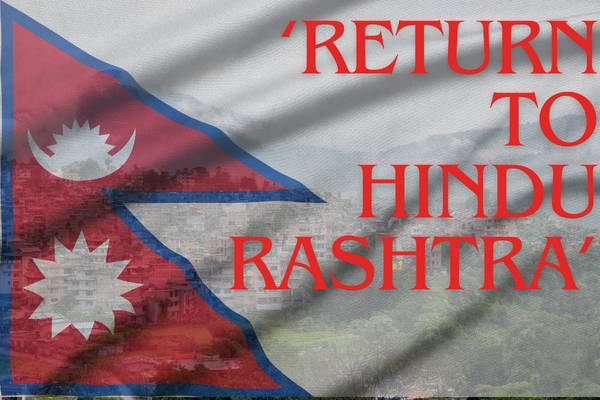Sixteen years after Nepal became a secular nation, discarding a Hindu tradition going back to 2000 BCE, demands that the country return to its saffron roots are being heard. Some members of the Nepali Congress (ruling in alliance with the Maoists), launched a signature campaign with the aim of winning the backing of the Mahasamiti, the party’s second highest decision-making body (the general convention is the top body in that sense).
The campaign was backed by 22 members of the Central Working Committee (CWC), who on February 16, formally registered their demand for restoration of the Hindu state (important to note that the word secular was inserted into the interim constitution in 2007 following the success of the people’s movement against the Hindu monarchy in 2006). But the move in the CWC failed, so the campaigners launched the signature campaign hoping to influence enough members to bring it on the agenda.
“By Wednesday afternoon (Feb 21), we collected signatures of over 970 Mahasamiti members which is nearly half of the total attendant members,” Shankar Bhandari, a central committee member of the Nepali Congress, who is leading the campaign, told Stratnewsglobal. There are around 2,200 Mahasamiti members and around 2,000 participated in the meeting which ended the next day without any discussion on the restoration of the Hindu state. Bhandari has been leading the campaign in his party for the restoration of the Vedic Sanatan Hindu Rashtra, but they are not demanding restoration of the monarchy. The campaigners said that around 40 CWC members including Sashanka Koirala, son of Nepal’s first elected Prime Minister Bishweshwar Prasad Koirala, also participated in the signature campaign. Koirala has long been advocating for the restoration of Hindu Rashtra.
“We are making efforts to ensure inclusion of this agenda during the Mahasamiti meeting,” Bhandari had told the Kathmandu Post. “As Vedic Sanatan Hindu Rashtra is connected with Nepal’s national identity and nationalism, we are making efforts to restore this.”
“As Sanatan (eternal) Hindu religion and culture is under attack in the name of secularism, we launched the campaign for restoration of the Hindu Rashtra,” said Lokesh Dhakal, another NC leader, claiming that “Secularism promoted religious conversion among Hindus at a rapid rate.”
He claimed that secularism was introduced in the constitution as part of a wider conspiracy to damage Nepal’s identity as a Vedic Sanatan Hindu nation. But the pious sentiments aside, Dhakal also acknowledged the potential for mobilising the Hindu sentiments of the electorate given that of Nepal’s 30 million population, 81% are Hindu.
The NC leaders have sought discussion about the matter at a time when smaller political forces including the old royalist RPP (Rashtria Prajatantra Party) have been running different campaigns for restoration of the Hindu state along with the monarchy. On Wednesday, the party handed over a 40-point memorandum to that effect, to Prime Minister Pushpa Kamal Dahal. Public meetings were also organised in Kathmandu.
RPP spokesperson Mohan Shrestha said the party would launch a nationwide movement starting from the third week of March, to build public support for restoration of the Hindu kingdom.
Also chasing the ‘Hindu sweepstakes’ is former CPN-UML (Communist Party of Nepal – Unified Marxist Leninist) leader and medical entrepreneur Durga Parsai. Under the banner “Campaign to protect nation, nationalism, religion, culture and citizens”, he is demanding the restoration of the monarchy.
He organised two mass gatherings in the capital Kathmandu in recent months, and has astutely used the same platform to highlight other issues, such as the financial hardship faced by people who are being charged high rates of interest by private bankers. It’s hard to say how much of this so-called ‘Hindu revival’ in Nepal is influenced by what is happening next door in India. But clearly, politicians across the ideological spectrum see Hinduism as providing new fodder for their political hopes, and the NC says the more the merrier. “Even the leftist parties should not hesitate to join hands in this campaign,” says Shrestha.
Kathmandu-based political scientist Hari Sharma believes that any attempt to restore the Hindu state “could herald constitutional derailment”, meaning that it could entail the pillars of the current constitution being dismantled such as the republican system, or secularism, or the push for social inclusion and so on.
Also, history is witness to the fact that the monarchy was never above politics, it interfered in political issues, took sides, and manipulated where necessary to ensure its power. Those campaigning for the restoration of the monarchy, have however been claiming that their country needs a ceremonial or constitutional monarch to act as guardian of the nation. In Delhi, South Block well remember how the monarchy tried to bring China into SAARC. Or for that matter, Nepal’s relationship with Pakistan, seen as an effort to balance India (Nepal and Pakistan tried to back China’s entry into SAARC during the royal regime). While Pakistan may have fallen off India’s Nepal radar, China remains a competitor and a rival because successive governments in Kathmandu see benefit in engaging with Beijing. So whether monarchy or republic, Nepal’s leaders will always seek to balance ties with India, and if that means reaching out to China, they will.





